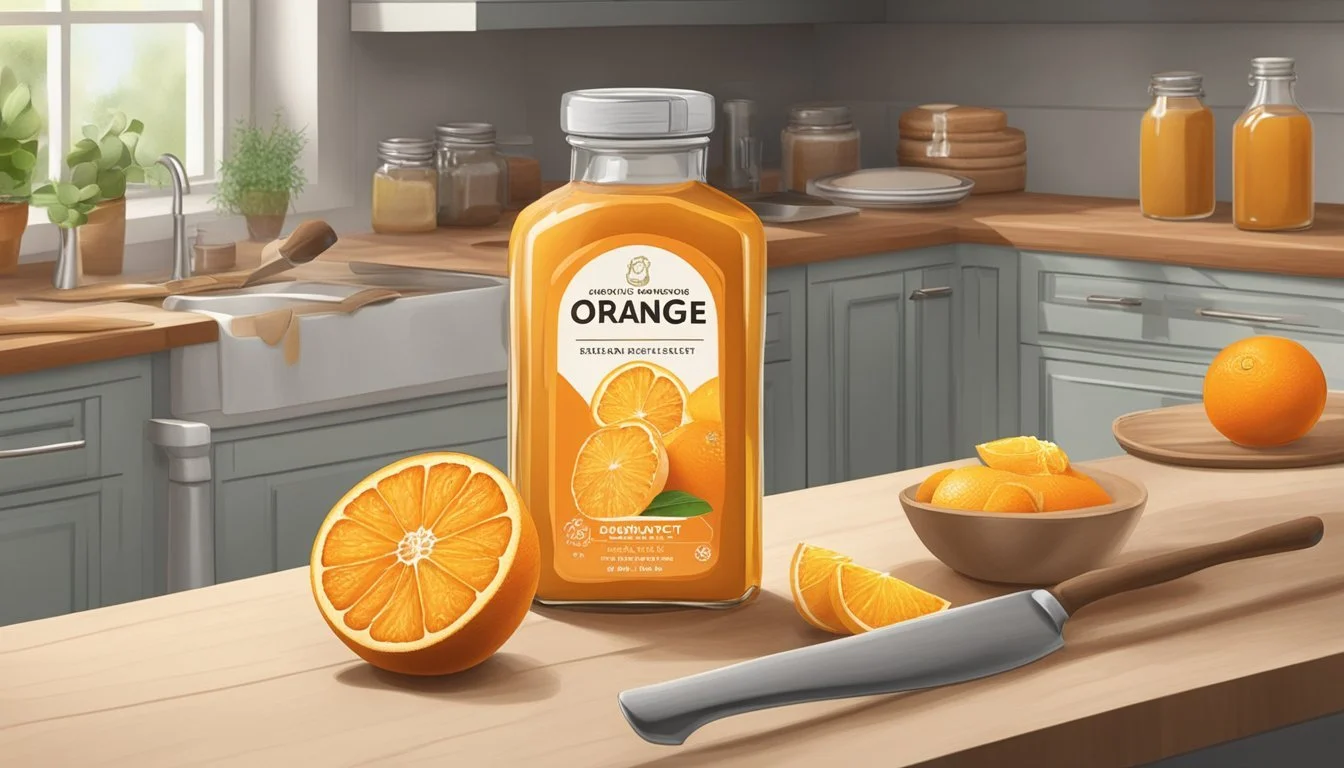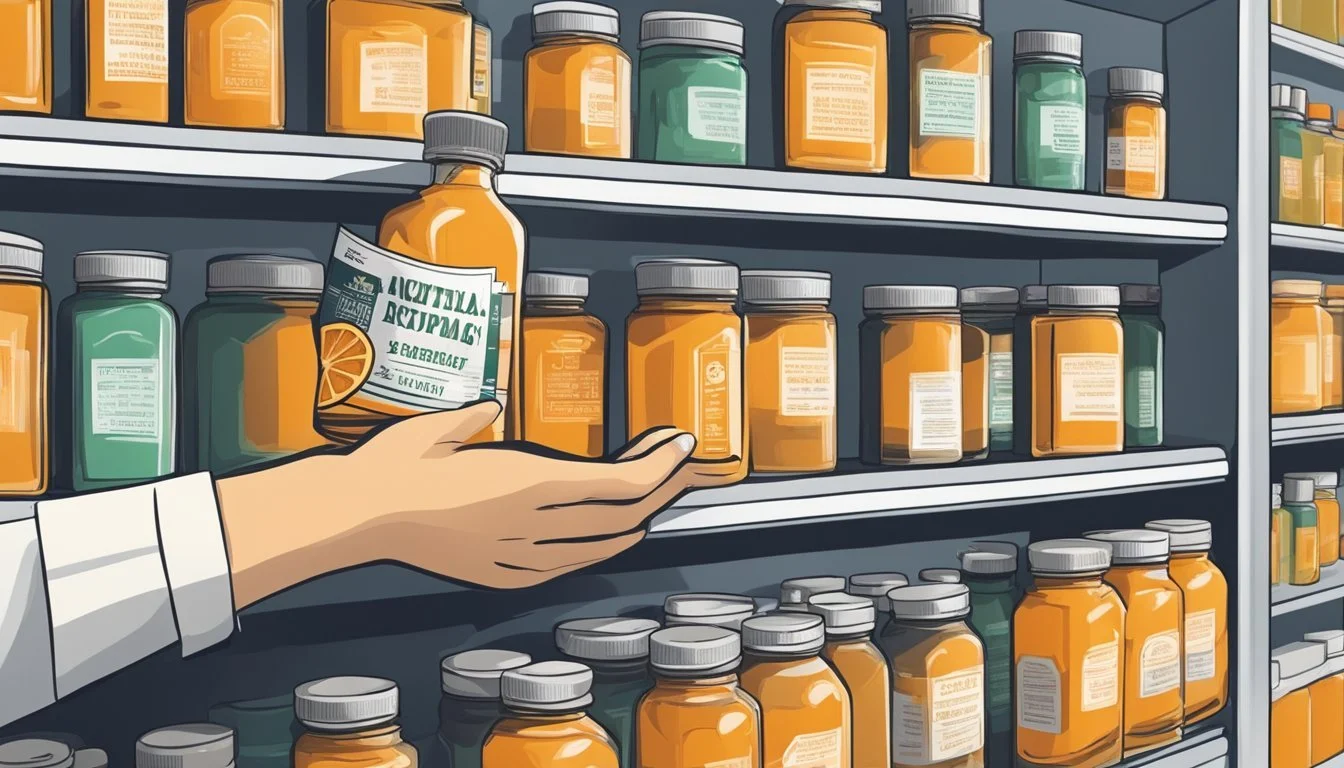Does Orange Extract Go Bad?
Shelf Life and Storage Tips
Orange extract is a popular flavoring ingredient in many kitchens, known for its vibrant citrus flavor and versatility. The question many home cooks and bakers ask is, does orange extract go bad? Properly stored, orange extract can generally maintain its best quality for about two to four years.
The longevity of orange extract largely depends on its storage conditions and whether the bottle has been opened. Unopened and stored in a cool, dark place, pure orange extract can last even longer. Once opened, it should be used within a year to ensure the flavor remains potent.
Pure orange extract, made from real orange peels and alcohol, tends to have a more enduring shelf life compared to artificial varieties. It’s crucial to keep the container tightly sealed to prevent the essential oils from evaporating, ensuring the extract retains its aromatic and flavor qualities.
Understanding Orange Extract
Orange extract is a versatile ingredient used widely in both sweet and savory dishes. It is prized for its concentrated citrus flavor and aromatic qualities, making it a staple in many kitchens.
Definition and Composition
Orange extract is derived from orange peels and primarily contains essential oils and alcohol. The essential oils are responsible for its distinct flavor profile and aroma. The extraction process typically involves soaking orange zest or peels in alcohol, which absorbs the oils and essence over time. This extract is usually available as a pure extract or imitation variety, with pure extracts delivering a more authentic citrus flavor.
Culinary Uses
Orange extract finds extensive use in diverse culinary applications. In baking, it enhances the flavor of cakes, cookies, and pastries. It also works well in both savory dishes and sweets by adding a fresh citrus note. Sauces, dressings, and marinades often benefit from its unique taste. Additionally, it can be used in drinks like cocktails to provide a burst of citrus fragrance and flavor.
Comparing to Other Citrus Extracts
When compared to other citrus extracts like lemon or lime, orange extract offers a different flavor profile. Lemon extract tends to be more tart and sharp, while orange extract provides a sweeter and slightly less acidic taste. Vanilla extract is another common comparison, although it gives a warm, sweet flavor rather than citrusy. Unlike pure orange oil, which can be very potent, orange extract is easier to measure and mix into recipes. By understanding these differences, one can choose the right extract for specific culinary needs.
Shelf Life of Orange Extract
The shelf life of orange extract depends on storage conditions, type of extract, and whether it's homemade or store-bought. Proper storage can extend its usability and preserve its aromatic qualities.
Factors Influencing Shelf Life
Type and Quality: Store-bought orange extract generally lasts between 3 to 4 years due to added preservatives. Homemade extracts typically last 6 months to 1 year.
Storage Conditions: Orange extract should be stored in a cool, dark place, such as a cupboard or pantry. Avoid exposure to heat and sunlight which can degrade the extract.
Seal and Packaging: Ensuring the extract is tightly sealed helps maintain its potency. Poorly sealed containers can lead to quicker degradation.
Signs of Degradation
Aroma: Fresh orange extract should have a strong, citrusy aroma. If the scent becomes weak or musty, it may be past its prime.
Consistency: Changes in texture, such as cloudiness or separation, can indicate spoilage.
Potency: A decrease in flavor intensity is a clear sign the extract is losing its efficacy.
Regularly checking these indicators can help determine if the extract is still good.
Optimal Storage Practices
Cool, Dark Place: Store the extract in a cupboard or pantry away from light and heat.
Tightly Sealed: Use containers with tight seals to prevent air exposure and prolong the extract's life.
Room Temperature: While refrigeration is not usually necessary, maintaining a stable room temperature is ideal. Fluctuations can affect the quality and shelf life.
Sticking to these practices ensures the extract remains potent and aromatic for as long as possible.
Health and Safety Considerations
Examining the health and safety aspects of orange extract is crucial to ensure proper usage and storage. This involves focusing on alcohol content's impact over time and the role of preservatives in extending shelf life.
Alcohol Content and Evaporation
Orange extract, especially the pure and high-quality varieties, often contains alcohol. This alcohol helps carry the flavor but can also evaporate over time. Proper storage is essential to minimize evaporation, which can reduce flavor potency and effectiveness.
Storing orange extract in a cool, dark place away from heat and light is ideal. It should be in tightly sealed bottles to prevent air exposure. For those concerned with organic or natural products, note that high alcohol content can naturally act as a preservative, reducing the need for artificial additives.
Presence of Preservatives
Preservatives play an important role in maintaining the shelf life of orange extract. Pure orange extract, made from real orange peels, typically contains fewer artificial preservatives than imitation varieties. This is critical for those prioritizing natural or organic ingredients.
Standard preservatives, whether natural or synthetic, help prevent mold and bacterial growth. They also contribute to retaining the extract's flavor profile longer. Always check labels for specific preservative information to ensure it aligns with personal health preferences and safety standards.
Culinary Applications
Orange extract offers versatility in the kitchen, enriching a variety of dishes and beverages with its vibrant citrus flavor. It pairs well with both sweet and savory recipes and can be used creatively in drinks and condiments.
Enhancing Sweet and Savory Dishes
Orange extract can elevate both desserts and main courses. In sweet treats like cakes, cookies, and ice creams, a teaspoon or two delivers a burst of citrus that balances sweetness. For savory dishes, orange extract can enhance flavors in marinades for chicken or pork, adding an aromatic citrus note that pairs well with soy sauce and other seasonings. It's also great in salad dressings, combining well with mint and maple for fresh, complex flavors.
Creative Uses in Drinks and Condiments
In beverages, orange extract shines by adding depth to cocktails, mocktails, and even coffee. Just a few drops can transform an ordinary orange juice into a more vibrant drink. Orange extract complements peppermint extract in holiday drinks or seasonal cocktails. For condiments, mix it into marmalades or sauces to create unique flavor profiles. It can turn homemade fruit syrups into aromatic toppings for pancakes and waffles.
Selecting Quality Orange Extract
Choosing the best orange extract involves considering both the brand's reputation and the purity of the extract. One must also decide between natural and artificial extracts based on desired flavor and ingredient preferences.
Brand and Purity
When it comes to orange extract, selecting a reputable brand is crucial for ensuring high-quality and potent flavor. Trusted brands often go through rigorous testing to provide products with concentrated flavor and minimal additives.
Purity is another important factor. Look for extracts labeled as pure or 100% orange extract, as these typically have the best quality. Kosher certifications can also be an indicator of stringent quality standards. High-quality extracts are usually free from preservatives, ensuring the extract maintains its true flavor.
Natural vs. Artificial Extracts
Natural orange extracts are made from real orange peels, providing a vibrant and authentic citrus taste perfect for various culinary applications. They contain no artificial ingredients and are preferred for their true-to-fruit flavor.
On the other hand, artificial extracts are formulated to mimic the taste of oranges but usually contain additional preservatives and additives. While they might offer good value for daily use in baking, they may lack the depth of flavor found in natural extracts.
When choosing between natural and artificial, consider the type of dishes being prepared and personal ingredient preferences. Opting for natural extracts ensures a more authentic taste, a significant consideration for high-quality cooking and baking.
DIY Orange Extract
Making your own orange extract at home is a straightforward process that involves simple ingredients and methods. It's essential to pay attention to the steps for extraction and proper storage to ensure the extract remains potent and aromatic.
Homemade Extraction Methods
To make homemade orange extract, start by washing and peeling oranges. Use a vegetable peeler to remove only the orange zest, avoiding the white pith, which can make the extract bitter. Place the zest in a sterilized glass jar.
Add vodka to the jar, ensuring the peels are completely submerged. Seal the jar with an airtight lid. Store the jar in a cool, dark place and shake it daily to help the extraction process.
Typically, it takes about four to six weeks for the extract to develop a strong orange aroma. After this period, strain out the peels and transfer the extract to a clean bottle with a label. This homemade extract can be used in various culinary applications just like store-bought ones.
Storing and Using Homemade Extracts
Proper storage is crucial to maintain the potency and flavor of homemade orange extract. Keep the extract in a cool, dark place, away from direct sunlight. An airtight container helps preserve the aromatic compounds and prevents contamination.
Properly stored, homemade orange extract can last up to a year. Always check for any changes in aroma or color as these can indicate spoilage.
This extract is versatile, ideal for enhancing desserts, marinades, and beverages with a vibrant citrus flavor. Using homemade extracts ensures you avoid artificial additives while enjoying a fresh, natural taste in your recipes.
Substitutes for Orange Extract
When orange extract is not available, there are several effective substitutes to achieve a similar citrusy flavor.
1. Orange Zest
Orange zest is a potent alternative. For every teaspoon of orange extract, use 1-2 teaspoons of orange zest. The zest contains essential oils that deliver a fresh, vibrant flavor.
2. Fresh Orange Juice
Fresh orange juice can replace orange extract, particularly in recipes where added moisture isn't an issue. Using 2 teaspoons of fresh juice for every teaspoon of orange extract works best.
3. Vanilla Extract
For a different but still complementary taste, vanilla extract can be used. Substitute one teaspoon of vanilla extract for one teaspoon of orange extract. This is ideal for baked goods requiring a subtle sweetness.
4. Lemon Extract or Zest
Lemon extract or zest provides a sharp, tangy flavor that can stand in for orange extract. Use equal parts lemon extract for orange extract or the same amount of lemon zest as you would orange zest.
5. Other Citrus Juices
In addition to orange and lemon, other citrus juices like lime or grapefruit can be used as substitutes. These alternatives offer a unique twist and can be used in the same ratio—2 teaspoons of juice for 1 teaspoon of orange extract.
These substitutes allow flexibility in recipes, ensuring the desired citrusy flavor is maintained.






